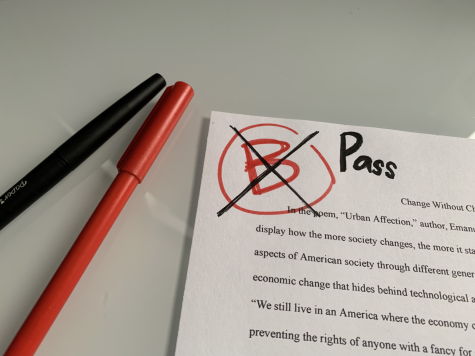College Counselor reacts to Assembly Bill 104
August 25, 2021

At least one campus college counselor is questioning the recent approval of Assembly Bill 104, which gave California public school students the option to change any letter grades from the past school year to a Pass/No Pass credit.
According to Sandra Cernobori, one of Palo Alto High School’s college counselors, this bill was intended for students who academically struggled this past year. However, some students have interpreted this decision to mean they can mask anything below an ‘A’ grade. Cernobori says this expectation for academic perfection directly results from the academic pressure present in the community.
“I think people get hung up on how this protects your GPA, not realizing that admissions folks are looking at a lot more than GPA,” Cernobori said. “I don’t think there are even conversations [about changing letter grades to credits] at other schools with students who have B’s and C’s, quite honestly.”
The bill states that students who received a grade of ‘D’ or below in the past 2020-21 school year could protect their grade point average using this new credit system, with change requests due to district Aug. 15. But some elements of Paly’s infamous GPA-focused student culture seems to have misinterpreted the AB104’s original purpose.
Cernobori raises concern that the window of time to change reported grades was inadequate considering how permanent and impactful this change may be for some students and their college application process.
“Many schools didn’t even start [before the deadline for a grade change submission],” Cernobori said, “And if school hasn’t even started, how are they going to know [about this bill and the deadline]?”
The bill was officially passed on July 1. However, Palo Alto Unified School District did not announce how it would approach this bill until four days before the deadline to officially change last year’s grades.
“I think it is ridiculous that this deadline was [announced] before many schools even started,” Cernobori said.
According to Cernobori, this bill was passed by the state of California to allow students to remain academically eligible during their admissions process despite the challenged presented by this past year of a pandemic.
“In a way, this is a little gift for them [students who academically struggled] given the pandemic and how hard it has been on folks,” Cernobori said.
As the bill states, by replacing a letter grade with a Pass/No Pass credit, student GPAs increase as a result of their barely-passing or failing grade being converted to a credit. While this may seem like the ideal scenario, the ‘P’ or ‘NP’ can work against them in college admissions offices, junior Pehla Durosinimi said.
“Most likely they [college admissions offices] would think I got a bad grade,” Durosinimi said.
Education Code Section 49066.5(b) says that any student who replaces a letter grade with a credit is legally protected from any prejudice held by The California State University admissions offices. When a CSU college sees a No Pass credit they can not assume the student received a ‘D’ grade in that class.
Cernobori said that when a ‘P’ is seen on a transcript, oftentimes the assumption that the student got a ‘D’ in the class is made. Cernobori said that, despite this bill and education code, this bias will still remain among many University of California, out-of-state public colleges, and private colleges.
“Even if you got a B and you change it to a P, they [colleges] are probably going to assume you did not pass with a C or higher, or you wouldn’t be changing your grade,” Cernobori said.
The University of California system announced that they will accept Pass/No Pass credits, but there is no guarantee that they will withhold any prejudice when seeing a Pass/No Pass on a student transcript.
“The way that the bill is written, it looks like you can change any grade; A, B, C, D, to a pass, and I don’t actually recommend it,” Cernobori said, “Those are passing grades.”




![In the fourth period AP Calculus BC class at Palo Alto High School, senior Crystal Li places her phone in the “phone jail.” Starting July 2026, this may become a normal procedure across schools in California thanks to Governor Gavin Newsom signing the Phone-Free School Act into law last week. According to Li, there are often unnecessary complications that come with enforcing phone restrictions. "It becomes a hassle putting it [a phone] in [the phone jail] before class, and taking it out after class," Li said. "There have been multiple times where kids from other periods interrupt the teacher to come back in and pick up a phone they left."](https://palyvoice.com/wp-content/uploads/2024/09/IMG_7386-3-300x225.jpg)




Sandra Cernobori • Aug 26, 2021 at 7:41 pm
A correction…the deadline for requesting the grade change is 15 days after posted on the educational institution’s website. So, I was mistaken; the PAUSD deadline is not the same as other schools’–it depends when they post the notice.